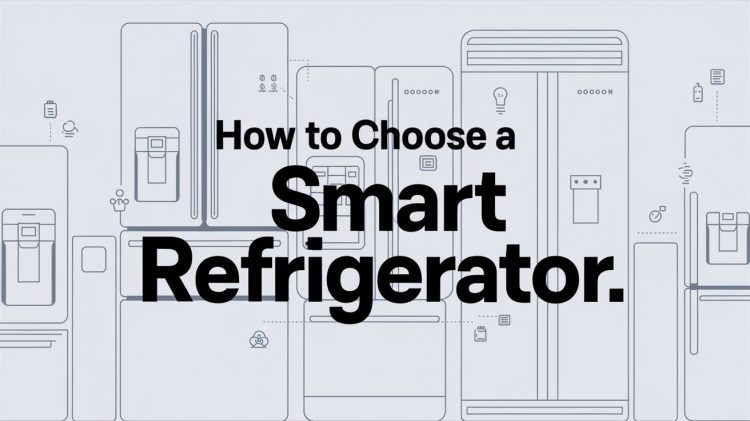A smart refrigerator is a significant investment for your kitchen, offering convenience, efficiency, and advanced features to make food storage and management easier. With so many options on the market, choosing the right smart refrigerator can feel overwhelming. Here’s a detailed guide to help you select the best one for your needs.
1. Determine Your Space and Size Requirements
The first step in choosing a smart refrigerator is to assess the available space in your kitchen. Measure the dimensions of the area where the refrigerator will be placed, including the height, width, and depth. Make sure to leave space for proper ventilation. Smart refrigerators come in various sizes, from compact models for smaller kitchens to large French door models for bigger families.
2. Understand the Features You Need
Smart refrigerators offer a range of innovative features designed to make your life easier. Consider which features are most important to you, such as:
- Wi-Fi Connectivity: The core feature of any smart fridge, Wi-Fi allows you to control the refrigerator remotely via your smartphone or voice assistants like Alexa and Google Assistant.
- Touchscreen Displays: Many models come with built-in touchscreens that allow you to access recipes, make grocery lists, view the inside of your fridge remotely, and even stream music or shows.
- Voice Control: Some smart fridges are compatible with voice assistants, enabling you to adjust settings, check inventory, or set reminders without lifting a finger.
- Smart Sensors: These sensors can detect temperature changes, humidity levels, and even door openings, allowing for more efficient energy use and better food preservation.
- Interior Cameras: Some models feature cameras inside the fridge, allowing you to check what’s in your fridge remotely via a mobile app. This is perfect for grocery shopping or meal planning without opening the door.
3. Energy Efficiency
Smart refrigerators are equipped with energy-efficient technologies that can save on electricity bills. Look for Energy Star-rated models, which meet high standards of energy efficiency. Features like auto-closing doors, LED lighting, and low-energy compressors can significantly reduce power consumption.
4. Storage Options and Flexibility
Consider the type of storage and flexibility you need in a refrigerator. Smart refrigerators often come with customizable shelves, drawers, and door bins. Key options to look for include:
- Adjustable Shelves: Ensure that shelves can be repositioned to accommodate taller items, such as bottles or large containers.
- Multi-zone Cooling: Some models offer different temperature zones for various types of food, such as a dedicated fruit and vegetable drawer or a freezer with separate compartments.
- Door-in-Door Design: This feature offers easy access to frequently used items, such as beverages and condiments, without having to open the entire refrigerator.
5. Freezer Type
Smart refrigerators come with different freezer configurations, including:
- Top Freezer: The most traditional design, often found in more budget-friendly models.
- Bottom Freezer: Offers easier access to refrigerated items, as the freezer is located at the bottom.
- Side-by-Side Freezer: Allows for wider storage space for both refrigerator and freezer compartments, though it can limit storage for larger items.
- French Door: A popular choice, with two side-by-side refrigerator doors on top and a bottom freezer, offering both style and functionality.
6. Smart Features Integration
Ensure the smart refrigerator integrates well with your existing home automation system or smartphone. Check if the fridge’s app is compatible with your devices and if it offers the features you need. Many brands offer their own apps that enable remote control, inventory tracking, and notifications about food expiry dates.
7. Noise Level
Smart refrigerators can be quieter than traditional models, but some can still produce noticeable sounds when the compressor kicks in. Check reviews for noise levels, especially if your kitchen is an open-concept space or near living areas.
8. Brand Reputation and Support
When investing in a smart refrigerator, it’s important to consider the reputation of the brand and the level of customer support offered. Popular brands like Samsung, LG, and Whirlpool are known for producing reliable smart refrigerators. Additionally, look for warranties that cover parts and labor, as smart appliances may need servicing.
9. Budget Considerations
Smart refrigerators can be more expensive than standard models, so it’s essential to determine your budget ahead of time. While you may want the latest technology and features, it’s important to weigh the benefits against the cost. There are smart refrigerator models at different price points, so prioritize the features that are most important to you.
Conclusion
Choosing the right smart refrigerator involves balancing the latest technology with your practical needs. Consider your kitchen’s size, desired features, energy efficiency, and budget when making a decision. A smart fridge can be a game-changer in your kitchen, helping you keep track of your groceries, reduce waste, and enjoy added convenience. With the right model, your kitchen will become smarter, more organized, and easier to manage.


No Comments
Leave Comment